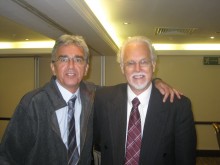Recovery-based psychiatrist Mark Ragins has an extraordinary collection of personal writing known as the Village Recovery Writings. Dr Mark worked for 27 years as the Medical Director at the MHALA Village in Long Beach, California, an award-winning model of recovery-based mental health care.
Why the Need for Recovery-based Care?
 A resonating message I have picked from many people affected by serious substance use problems over the years is their desperate need for hope (that they can recover) and understanding (of how to recover). Here is a blog I originally posted in May 2013.
A resonating message I have picked from many people affected by serious substance use problems over the years is their desperate need for hope (that they can recover) and understanding (of how to recover). Here is a blog I originally posted in May 2013.
There is a dearth of readily accessible information on how to achieve recovery, information that is also relevant to the day-to-day struggles and obstacles that people face in trying to overcome addiction and related problems. Many people do not know anyone who has recovered from addiction. Many find the treatment system to be disempowering and lacking in hope.
Read More ➔
Recovery and recovery-based care
“Never doubt that a small group of thoughtful, committed citizens can change the world; indeed, it’s the only thing that ever has.”
Margaret Mead, US cultural anthropologist
 Here’s a little section I wrote for a book I am working on.
Here’s a little section I wrote for a book I am working on.
‘1. The Problems
Substance use problems represent a major concern in society today. These problems do not just arise from use of illegal drugs, but also from alcohol, solvents and addictive prescription drugs. They are intimately tied up with, and can be caused by, social, emotional and/or mental health problems. A person’s substance use problems impacts negatively on the wellbeing of family members and other loved ones.
Far too few people are recovering from the problems caused by drugs and alcohol, in large part because of shortcomings in the systems of care that society has developed. Many people circulate in and out of treatment, and much of the treatment system has become disempowering and lacking in hope.
The prejudice and stigma that exists in society towards individuals and families affected by substance use problems is also a strong barrier to recovery.
What Works in Treatment?: Sapphire’s Story, Part 1
 Sapphire’s Story shows the importance of person-centered treatment. Things went well when Sapphire was intimately involved in decisions about her treatment, but poorly when professionals took sole control. We’ll look at various stages of Sapphire’s treatment career.
Sapphire’s Story shows the importance of person-centered treatment. Things went well when Sapphire was intimately involved in decisions about her treatment, but poorly when professionals took sole control. We’ll look at various stages of Sapphire’s treatment career.
Sapphire was being prescribed methadone for her heroin addiction, but as the dose was not high enough she was suffering withdrawal symptoms. To counter the discomfort of this withdrawal, she was purchasing methadone on the street and using benzodiazepines. Then a problem arose from her urine sample:
‘When I was 25, my urine screening revealed that I was taking benzos and the CDT sent me to a shared care GP who was to prescribe my methadone and benzos. At my first appointment, I decided to be honest and tell the GP about the methadone I was buying, and how bad my benzo use had become.
Recovery as an organising construct – Bill White interviews Larry Davidson
 I have just been reading a Bill White interview of Larry Davidson – the two people who have most impacted on my work – and I was very interested by Larry’s response to these two questions about the mental health field. What is said is of course highly relevant to the addiction field.
I have just been reading a Bill White interview of Larry Davidson – the two people who have most impacted on my work – and I was very interested by Larry’s response to these two questions about the mental health field. What is said is of course highly relevant to the addiction field.
Bill White: How is the emergence of recovery as a new organizing paradigm changing the design and delivery of mental health services in the United States?
Larry Davidson: I think the biggest change that the recovery paradigm has introduced, and the change that poses the most difficulty for traditional clinicians to understand and accept, is that recovery is primarily the responsibility of the person rather than the practitioner.
Recovery Vision: New paradigm, new questions, new answers
I’ve just watched this wonderful talk (from 2001) by Bill Anthony, one of the pioneers in recovery-based care in mental health. [Bill starts his talk at 25’20” into the video]
Bill describes a metaphor for explaining a paradigm shift, such as the paradigm shift to recovery-based care in mental health.
This metaphor is that mankind once thought the world was flat. This understanding led to certain questions such as, “How far do I sail before I fall off the end of the earth?” Once mankind learnt the world was round, these questions were redundant. We asked different questions.
Arthur C. Evans Honored for Addiction Recovery Work
 Found this excellent article in the Philadelphia Tribune. Well done Arthur and and his colleagues who have helped make his Award possible. What they have achieved in Philadelphia in terms of developing a recovery-based care system is an example to us all.
Found this excellent article in the Philadelphia Tribune. Well done Arthur and and his colleagues who have helped make his Award possible. What they have achieved in Philadelphia in terms of developing a recovery-based care system is an example to us all.
‘Arthur C. Evans, Ph.D. Philadelphia Commissioner of the Department of Behavioral Health and Intellectual disAbility Services (DBHIDS) has been recognized for his strides in promoting recovery from addiction.
Faces & Voices of Recovery honored Evans with the Lisa Mojer-Torres Award at the America Honors Recovery event held on June 26 in Washington, D.C. America Honors Recovery highlights the extraordinary contributions of the country’s most influential recovery community leaders and organizations and is sponsored with Caron Treatment Centers.
Special Award for Philadelphia’s Dr. Arthur C. Evans
 Here’s some wonderful news from Faces & Voice of America:
Here’s some wonderful news from Faces & Voice of America:
‘Philadelphia’s Behavioral Health Commissioner Dr. Arthur C. Evans to receive Lisa Mojer-Torres Award
Faces & Voices of Recovery and Caron Treatment Centers invite you to join us at an evening reception recognizing the outstanding contribution of Dr. Arthur C. Evans, Commissioner of Philadelphia’s Department of Behavioral Health and Intellectual disAbility.
Why the need for recovery-based care?
 A resonating message I have picked from many people affected by serious substance use problems over the years is their desperate need for hope (that they can recover) and understanding (of how to recover).
A resonating message I have picked from many people affected by serious substance use problems over the years is their desperate need for hope (that they can recover) and understanding (of how to recover).
There is a dearth of readily accessible information on how to achieve recovery, information that is also relevant to the day-to-day struggles and obstacles that people face in trying to overcome addiction and related problems. Many people do not know anyone who has recovered from addiction. Many find the treatment system to be disempowering and lacking in hope.




